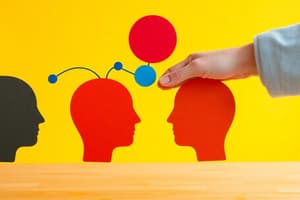Podcast
Questions and Answers
What is the definition of "To persuade"?
What is the definition of "To persuade"?
Pathos/Logos/Ethos
What is the quote attributed to Kant about discipline?
What is the quote attributed to Kant about discipline?
Discipline makes the unsociable sociable
What quote is attributed to the text about "Learning without thinking is a labor loss, thinking without learning is danger"?
What quote is attributed to the text about "Learning without thinking is a labor loss, thinking without learning is danger"?
Learning without thinking is a labor loss, thinking without learning is danger.
What does RED stand for according to the text?
What does RED stand for according to the text?
A manager makes numbers grow.
A manager makes numbers grow.
A leader makes people grow.
A leader makes people grow.
Which of the following is NOT considered a soft skill according to the text?
Which of the following is NOT considered a soft skill according to the text?
Which of the following is NOT one of the aspects of "Emotional Intelligence" as mentioned in the text?
Which of the following is NOT one of the aspects of "Emotional Intelligence" as mentioned in the text?
Laissez-faire leadership allows followers free rein to set their own goals.
Laissez-faire leadership allows followers free rein to set their own goals.
The Michigan Leadership style identifies two basic leadership styles: leadership-oriented and employee-oriented.
The Michigan Leadership style identifies two basic leadership styles: leadership-oriented and employee-oriented.
The Ohio State of Leadership identified two dimensions: Consideration and Initiating Structure.
The Ohio State of Leadership identified two dimensions: Consideration and Initiating Structure.
McGregor's Theory X managers think that people do not like to work and like strict supervision.
McGregor's Theory X managers think that people do not like to work and like strict supervision.
Theory Y managers think that work is a source of satisfaction and want the responsibility.
Theory Y managers think that work is a source of satisfaction and want the responsibility.
In the text, what does "Dynamic Tension" refer to?
In the text, what does "Dynamic Tension" refer to?
"Formal Leadership" is based on the authority of a formal position.
"Formal Leadership" is based on the authority of a formal position.
"Informal Leadership" is the unofficial leadership accorded to a person by other members of the organization.
"Informal Leadership" is the unofficial leadership accorded to a person by other members of the organization.
The process of being guided and directed by a leader is called "Followership."
The process of being guided and directed by a leader is called "Followership."
What is the quote attributed to Lahbabi?
What is the quote attributed to Lahbabi?
Flashcards
Pathos/Logos/Ethos
Pathos/Logos/Ethos
Methods of persuasion: Pathos (emotions), Logos (logic), Ethos (credibility).
Learning (journey vs destination)
Learning (journey vs destination)
Learning is a continuous process, not a fixed point.
Kant's quote on discipline
Kant's quote on discipline
Discipline makes the unsociable person sociable.
Manager vs. Leader
Manager vs. Leader
Managers focus on numbers; leaders inspire people.
Signup and view all the flashcards
Leader's role
Leader's role
Guides and inspires a group toward a goal with a clear vision and defined mission.
Signup and view all the flashcards
Soft skills
Soft skills
Important skills like communication, teamwork etc.
Signup and view all the flashcards
Communication (Dynamic Process)
Communication (Dynamic Process)
Process of sending and receiving verbal and nonverbal messages in various contexts.
Signup and view all the flashcards
Time Management
Time Management
Prioritizing tasks, avoiding procrastination, and scheduling.
Signup and view all the flashcards
Resilience
Resilience
Adapting to change; ability to recover from difficulties.
Signup and view all the flashcards
RED Method
RED Method
Recognize assumptions, Evaluate information, Draw conclusions.
Signup and view all the flashcards
Emotional Intelligence (EI)
Emotional Intelligence (EI)
Understanding and managing your emotions, and those of others.
Signup and view all the flashcards
Self-awareness (EI)
Self-awareness (EI)
Understanding your own strengths and limitations.
Signup and view all the flashcards
Self-control (EI)
Self-control (EI)
Controlling your emotions and impulses.
Signup and view all the flashcards
Self-motivation (EI)
Self-motivation (EI)
Driving yourself to achieve goals.
Signup and view all the flashcards
Empathy (EI)
Empathy (EI)
Understanding and sharing the feelings of others.
Signup and view all the flashcards
People skills
People skills
Skills derived from personal background
Signup and view all the flashcards
Socrates' quote
Socrates' quote
Use your senses more than your words. Hear and see more than you speak.
Signup and view all the flashcards
Authoritarian leadership
Authoritarian leadership
Directive leadership style with strong control.
Signup and view all the flashcards
Democratic leadership
Democratic leadership
Collaborative leadership style.
Signup and view all the flashcards
Laissez-faire leadership
Laissez-faire leadership
Passive leadership style, avoiding responsibilities.
Signup and view all the flashcards
Task-oriented leadership
Task-oriented leadership
Focuses on production and efficiency.
Signup and view all the flashcards
Interpersonal leadership
Interpersonal leadership
Focuses on relationships and understanding.
Signup and view all the flashcardsStudy Notes
Leadership
- Learning without thinking is a loss, thinking without learning is dangerous.
- Persuasion is achieved through pathos, logos, and ethos.
- Learning is a journey, not a destination.
- Kant: Discipline makes the unsociable sociable.
Leader/Manager Differences
- Managers increase numbers (quantifiable results).
- Leaders inspire people (qualitative growth).
- A leader guides a group towards a shared goal.
- Leaders combine a clear vision with a strong purpose.
- Good leaders motivate teams, outlining their purpose.
- Soft skills are important: communication, teamwork, creativity, social skills, time management, resilience, and emotional intelligence.
- Communication is a dynamic process of encoding and decoding verbal and non-verbal messages.
Resilience
- Resilience is adapting to change rather than intelligent or strength.
Emotional Intelligence
- Self-awareness: knowing your limits.
- Self-control: controlling emotions.
- Self-motivation: intrinsic and extrinsic motivation.
- Empathy: understanding others' perspectives.
Leadership Styles
- Formal leadership: official position with authority.
- Informal leadership: unofficial influence from others.
- Authoritarian: controlling and strong.
- Laissez-faire: hands-off, followers make own decisions.
- Democratic: collaborative, involving followers.
Styles of Leadership Based on Generations
- Veterans: value trust and experience.
- Baby Boomers: appreciate appreciation and mentorship.
- Gen X: value balance and truthfulness.
- Gen Nexters: structure, clearer goals and leadership.
Task vs Interpersonal Orientation
- Task-oriented: focus on productivity, ignoring feelings.
- Interpersonal-oriented: focus on relationships, recognizing feelings.
Leadership Theories
- Michigan Leadership: Focused on employee orientation and leadership orientation.
- Ohio State Leadership: focused on consideration and initiating structure.
- McGregor's Theory X and Y: Theory X managers believe people dislike work, while Theory Y managers think work is a source of satisfaction.
- Black and Macanese's Leadership Grid charts leadership based on concern for people and concern for production.
Followership
- Passive followers: low critical thinking and participation.
- Conformists: high participation, low critical thinking.
- Alienated followers: passive but individualistic critical thinkers.
- Pragmatists: balance; resilient in difficult situations.
- Exemplary followers: high critical thinking and participation.
Leadership and Management
- Leadership: setting direction, aligning with it, inspiring actions, growing potential.
- Management: planning, organizing, controlling, problem-solving, seeking stability.
- Leadership creates change while management seeks order.
Studying That Suits You
Use AI to generate personalized quizzes and flashcards to suit your learning preferences.




